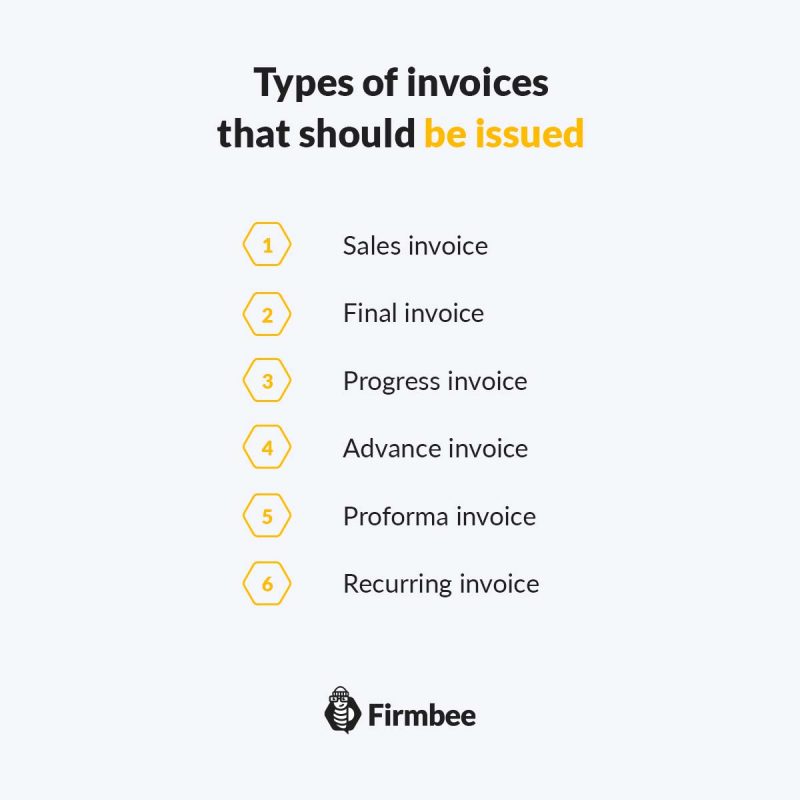Issuing invoices is one of the more enjoyable parts of being an entrepreneur. Why? Because it’s the final step to getting paid. But the question arises – when to issue an invoice so that it is legal? It turns out that there is no single answer to this question. It all depends on the circumstances. Most often, an invoice is issued after the delivery of goods or services. However, there are some exceptions. This article will explain when you should issue invoices. It mainly depends on the type of invoice, so we will discuss here those that occur most frequently.
When should you issue an invoice? – table of contents:
- Sales invoice
- Final invoice
- Progress invoice
- Advance invoice
- Proforma Invoice
- Recurring invoice
- Check out how to issue invoices with Firmbee
Sales invoice
This is a fairly common way of issuing invoices. It is especially encountered in stores. When you, as the vendor, hand over the purchased items to the customer in person, you can also issue an invoice right away. In this case, it is usually connected with accepting payment, either in the form of cash or payment by credit card. However, it may happen outside your company that you deliver goods directly to the customer.
It would seem that being out of your office you won’t be able to invoice your customer right away. Fortunately, you can use a mobile invoicing app. This allows you to invoice using your smartphone. And what about printing? You don’t have to, because you can email the invoice. An electronic invoice has the same legal value as a paper invoice.
Final invoice
For services, it is common to see invoices issued after the work is completed. How are they different from invoices issued on the day of the sale? Theoretically, the moment you have finished your service you can issue an invoice. This is a good way to do it if you have personal contact with the client. In this case, the customer immediately sees the results of your work and can accept and approve the invoice.
However, if the customer has not yet seen the work that you have done for him, it is better to check whether he is satisfied with the final result. If they have any comments, you can make corrections before issuing an invoice. Otherwise, it could turn out that the customer does not accept the invoice because he has commented on the project. This would prolong the payment process. You can avoid this by sending the customer a message asking if they accept the work done, and if not, what corrections are still needed.
With confirmation from the client that everything is fine, you can confidently issue an invoice for the services rendered.
Progress invoice
Partial invoices can be encountered especially for larger projects. In this case, the work can be divided into stages. After their completion, an invoice is issued that covers the completed work. Where can you meet this type of invoicing? Every time the whole work is stretched over time.
This happens, for example, during the construction of a house. The company that performs the work can issue invoices after the completion of individual stages. This way of invoicing ensures cash flow and avoids payment bottlenecks, as well as a high bill after all is completed. For long-term projects, it is a good idea to establish a payment schedule at the beginning. It can indicate certain milestones after which partial invoices will be issued.

Advance invoice
If the services you provide require you to commit significant funds for the purchase of components necessary to perform the contracted work then you can offer to pay in advance. In this case, you issue an invoice before the work is done.
This solution proves useful when your services are quite expensive and the unexpected cancellation of your services by the client would have a negative financial effect on you. When can such a situation occur? For example, when you are a wedding photographer and the assignment involves capturing a wedding ceremony at a location specified by the client. If a client cancels the service a day before the event, you will most probably not find another person willing to shoot there on that day. Payment in advance will secure your interests so that in such case you will not be at a loss.
Proforma Invoice
A preliminary invoice is also known as a proforma invoice. At first glance, a proforma invoice and an advance invoice may seem similar. However, they are not the same thing. An advance invoice obliges you to pay, whereas a proforma invoice does not create such an obligation. It is rather an invitation to enter into a contract.
You issue such an invoice as a price proposal for the sale of goods or provision of services even before the customer agrees to delivery. Customers ask for such invoices for example to compare offers from several companies or to check whether a given expense will fit into their budget. If the customer agrees to your terms and conditions, you can process the order and then issue a regular invoice, which, unlike a preliminary invoice, will entail an obligation to pay for the delivered goods or services.
Recurring invoice
In some types of business, recurring invoices are common. It is popular for them to take the form of a flat-rate invoice, that is, one that has a rate set in advance regardless of the amount of work incurred. Where can you find such invoices? For example, if you run a cleaning company and you have agreed with your client on a fixed rate for weekly office cleaning, you will charge your client the same amount for each week, no matter how long it takes.
In such a case, an invoicing program can be a great help in issuing recurring invoices. All you have to do is enter your clients’ data, indicate the day on which the invoice should be issued, and enter the amount and the program will issue cyclical invoices and send them to your clients.
Check out 5 best free invoicing software solutions!
Check out how to issue invoices with Firmbee:
If you like our content, join our busy bees community on Facebook, Twitter, LinkedIn, Instagram, YouTube, Pinterest.
Author: Andy Nichols
A problem solver with 5 different degrees and endless reserves of motivation. This makes him a perfect Business Owner & Manager. When searching for employees and partners, openness and curiosity of the world are qualities he values the most.


















